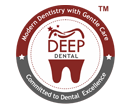Keeping your teeth clean!
Deep Dental recommends the following for good oral
hygiene:
Brush your teeth twice a day with fluoride toothpaste. Replace tooth brush every three to four months or sooner bristles frayed. A worn toothbrush won’t do a good job of cleaning your teeth

- Clean between the teeth daily with floss or an interdental cleaner. Decay-causing bacteria still linger between teeth where toothbrush bristles can’t reach. This helps remove plaque and food particles from between the teeth and under the gum line.
- Eat a balanced diet and limit between-meal snacks.
• Visit your dentist regularly for professional cleanings and oral check ups
Antimicrobial mouth rinses and toothpastes reduce the bacterial count and inhibit bacterial activity in dental plaque, which can cause gingivitis, an early reversible form of periodontal (gum) disease. Fluoride mouthwashes help reduce and prevent tooth decay. Clinical studies have demonstrated that use of fluoride mouth-rinse and fluoride toothpaste can provide extra protection against tooth decay over that provided by fluoride toothpaste alone. Fluoride mouthwash is not recommended for children age six or younger because they may swallow the mouthwash. Consumers should always check the manufacturer’s label for precautions and age recommendations and talk with their dentist about the use of fluoride mouth-rinse. Talk to your dentist about what types of oral care products will be most effective for you.
How do I brush my teeth?
- Place your toothbrush at a 45-degree angle against the gums.
- Move the brush back and forth gently in short (tooth- wide) stroke.
- Brush the outer, inner and the chewing surfaces of the teeth.
- Use the ‘toe’ of the brush to clean the inside surfaces of the front teeth with a gentle up-down stroke.
- Brush your tongue to remove bacteria and to freshen your breath.
How do l floss my teeth?
- Break off about 18 inches of floss and wind most of it around one of your middle fingers. Wind the remaining floss around the same finger of the opposite hand. This finger will take up the floss as it becomes dirty. Hold the floss tightly between your thumbs and forefingers.
- Guide the floss between your teeth using a gentle rubbing motion. Never snap the floss into the gums.
- When the floss reaches the gum line, curve it into a C shape against one tooth. Gently slide it into the space between the gum and the tooth.
- Hold the floss tightly against the tooth. Gently rub the side of the tooth, moving the floss away from the gum with up and down motions.
- Repeat this method on the rest of your teeth.

